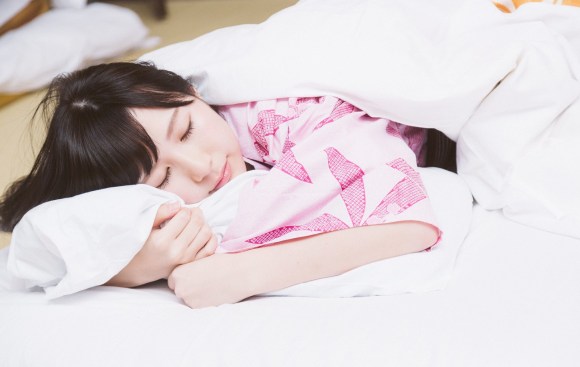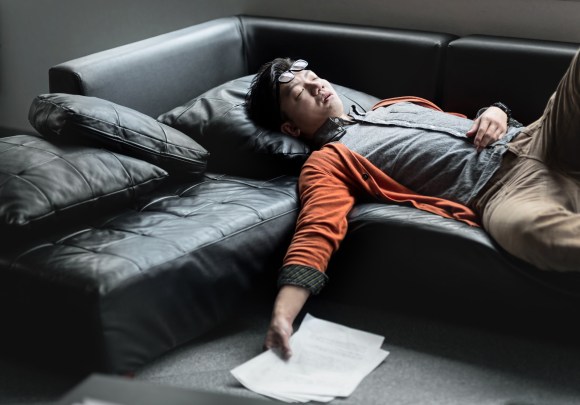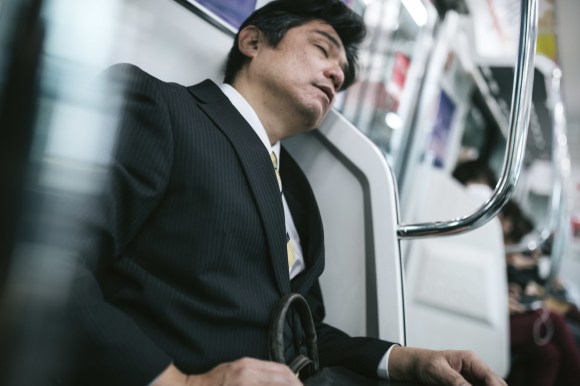
Japanese men and women seem to sleep as much as one hour less than people from other countries.
In 2014, we shared a study that suggested that Japanese citizens sleep far less than their international counterparts. Four years have passed, and it seems like that still holds true. Using worldwide data compiled through their Polar A370 and Polar M430 model fitness trackers, Polar Electro’s Japan branch revealed that once again, Japan is lacking in the sleep department.
The data compares male and female fitness tracker users from 28 countries all over the world, and reveals that Japanese men and women sleep an average of 6 hours and 35 minutes per night, which is 45 minutes less than the international average, and nearly an hour difference from Finland, whose users seem to sleep the most.
The top five countries where men and women got the most sleep on average were:
- Men: Finland (7:24), women: Finland and Belgium (7:45)
- Men: Estonia (7:23)
- Men and women: France and Estonia (7:23 and 7:44 respectively)
- Men and women: Austria (7:21 and (7:36, respectively)
- Men: Holland (7:20), women: Holland and Canada (7:41)
▼ They probably wake up nice and refreshed everyday, like this girl.
The U.K. also ranks fairly highly, eighth for men and eleventh for women, while the U.S. ranks a bit lower, sixteenth for men and thirteenth for women. The five bottom countries, where men and women got the least amount of sleep, with five being the least, were:
- Men: Colombia (6:49), women: China (7:11)
- Men: Brazil (6:47), women: Colombia (7:10)
- Men: Israel and Hong Kong (6:42), women: Hong Kong (6:59)
- Women: Israel (6:51)
- Men and women: Japan (6:30 and 6:40 respectively)
Chinese men also slept little compared to other men, with an average of 6 hours and 52 minutes per night, but Japan takes the cake for both sexes barely surpassing six and a half hours of sleep per night. In fact, only seven countries’ men and three countries’ women averaged less than seven hours per night, which makes Japan’s short sleeps even more significant.
▼ Our guess is that this guy isn’t from one of the top five.
What’s interesting is that, despite Japanese workers’ infamously long commutes to work, they’re not getting up any earlier than most of their counterparts. They are, however, going to bed much later. Men in Japan on average go to bed later than those in almost every other country except Hong Kong, Brazil, China, and Spain, and the only women who went to bed later than Japanese women were from Hong Kong and Spain. However, women slept more and went to bed earlier than men in all of the countries, though about half woke up earlier than men.
These results don’t include the age or occupation of the participants, and it’s important to keep in mind that this is also a group of presumably fitness-minded individuals, judging from the fact that they own and regularly wear a fitness tracker. They could be making more conscious efforts to sleep longer than others, so these results may skewed, and should be taken with a grain of salt. That might also be why this group of Japanese men and women has slept more than the group analyzed in the 2014 study, though without a control group, it’s hard to say.
▼ It is probably why you can often see people sleeping on the train in Japan, though.
Nevertheless, it’s an interesting collection of data, and despite the differences with the 2014 group, the study still came to the same conclusion: Japanese people sleep less than other people. That might give cause to wonder why Japanese men and women go to bed so late and sleep so little, and naturally the first thought that comes to mind is that the Japanese work very long hours, with lots of stress that can result in lack of sleep. Social obligations after working those long hours, like company drinking parties, which are an integral part of Japanese work culture, may also be why Japanese men and women are going to bed so late.
On the other hand, there are plenty of ways to catch a snooze during the day in Japan, like on the train, at a sleep cafe, or even with a magical sleep-inducing massage. It could be that all of these little snoozes throughout the day are making up for Japanese workers’ lost sleep in the end.
Source: IT Media News via Otakomu
Top image: Pakutaso
Images: Pakutaso (1, 2, 3)




 Study finds Japan to be the country that most prefers aisle seats on airplanes
Study finds Japan to be the country that most prefers aisle seats on airplanes Japanese study finds link between taking frequent baths and happiness, may not tell whole story
Japanese study finds link between taking frequent baths and happiness, may not tell whole story Government survey finds teleworking at least once per week raises Japanese worker happiness level
Government survey finds teleworking at least once per week raises Japanese worker happiness level Late to bed, early to rise: Statistics suggest Japan seriously skimps on sleep
Late to bed, early to rise: Statistics suggest Japan seriously skimps on sleep Survey shows that many Japanese business people’s sleep patterns have changed since teleworking
Survey shows that many Japanese business people’s sleep patterns have changed since teleworking Japanese restaurant chain serves Dragon Ball donuts and Senzu Beans this spring
Japanese restaurant chain serves Dragon Ball donuts and Senzu Beans this spring Can we be just like Shohei Ohtani on a budget with a Hello Kitty cap?
Can we be just like Shohei Ohtani on a budget with a Hello Kitty cap? Japan Extreme Budget Travel! A trip from Tokyo to Izumo for just 30,000 yen [Part 2]
Japan Extreme Budget Travel! A trip from Tokyo to Izumo for just 30,000 yen [Part 2] Japan’s craziest burger chain takes menchi katsu to new extreme levels
Japan’s craziest burger chain takes menchi katsu to new extreme levels Eevee returns to Japan’s famous Tokyo Banana, bundled with a cute tote bag
Eevee returns to Japan’s famous Tokyo Banana, bundled with a cute tote bag Create your own Sailor Moon heroines with the awesome Sailor Senshi Maker
Create your own Sailor Moon heroines with the awesome Sailor Senshi Maker Starbucks Japan releases first-ever Hinamatsuri Girls’ Day Frappuccino
Starbucks Japan releases first-ever Hinamatsuri Girls’ Day Frappuccino Take a trip to Japan’s Dododo Land, the most irritating place on Earth
Take a trip to Japan’s Dododo Land, the most irritating place on Earth Extreme Budget Travel! Can you do a trip to Manila with 50,000 yen (US$333)? – Part 1
Extreme Budget Travel! Can you do a trip to Manila with 50,000 yen (US$333)? – Part 1 Our writer of Korean descent weighs in on using Korean names in Japan
Our writer of Korean descent weighs in on using Korean names in Japan Highest Starbucks in Japan set to open this spring in the Tokyo sky
Highest Starbucks in Japan set to open this spring in the Tokyo sky Tokyo Skytree turns pink for the cherry blossom season
Tokyo Skytree turns pink for the cherry blossom season Yakuzen ramen restaurant in Tokyo is very different to a yakuza ramen restaurant
Yakuzen ramen restaurant in Tokyo is very different to a yakuza ramen restaurant Japan Extreme Budget Travel! A trip from Tokyo to Izumo for just 30,000 yen [Part 1]
Japan Extreme Budget Travel! A trip from Tokyo to Izumo for just 30,000 yen [Part 1] Japan has only one airport named after a samurai, so let’s check out Kochi Ryoma【Photos】
Japan has only one airport named after a samurai, so let’s check out Kochi Ryoma【Photos】 Japanese drugstore sells onigiri at pre-stupid era prices, but how do they compare to 7-Eleven?
Japanese drugstore sells onigiri at pre-stupid era prices, but how do they compare to 7-Eleven? Burning through cash just to throw things away tops list of headaches when moving house in Japan
Burning through cash just to throw things away tops list of headaches when moving house in Japan Starbucks Japan releases new sakura goods and drinkware for cherry blossom season 2026
Starbucks Japan releases new sakura goods and drinkware for cherry blossom season 2026 Japan’s newest Shinkansen has no seats…or passengers [Video]
Japan’s newest Shinkansen has no seats…or passengers [Video] Foreigners accounting for over 80 percent of off-course skiers needing rescue in Japan’s Hokkaido
Foreigners accounting for over 80 percent of off-course skiers needing rescue in Japan’s Hokkaido Super-salty pizza sends six kids to the hospital in Japan, linguistics blamed
Super-salty pizza sends six kids to the hospital in Japan, linguistics blamed Starbucks Japan unveils new sakura Frappuccino for cherry blossom season 2026
Starbucks Japan unveils new sakura Frappuccino for cherry blossom season 2026 Foreign tourists in Japan will get free Shinkansen tickets to promote regional tourism
Foreign tourists in Japan will get free Shinkansen tickets to promote regional tourism The 10 most annoying things foreign tourists do on Japanese trains, according to locals
The 10 most annoying things foreign tourists do on Japanese trains, according to locals Naruto and Converse team up for new line of shinobi sneakers[Photos]
Naruto and Converse team up for new line of shinobi sneakers[Photos] Is China’s don’t-go-to-Japan warning affecting the lines at a popular Tokyo gyukatsu restaurant?
Is China’s don’t-go-to-Japan warning affecting the lines at a popular Tokyo gyukatsu restaurant? Survey asks foreign tourists what bothered them in Japan, more than half gave same answer
Survey asks foreign tourists what bothered them in Japan, more than half gave same answer Japan’s human washing machines will go on sale to general public, demos to be held in Tokyo
Japan’s human washing machines will go on sale to general public, demos to be held in Tokyo Starbucks Japan releases new drinkware and goods for Valentine’s Day
Starbucks Japan releases new drinkware and goods for Valentine’s Day We deeply regret going into this tunnel on our walk in the mountains of Japan
We deeply regret going into this tunnel on our walk in the mountains of Japan Studio Ghibli releases Kodama forest spirits from Princess Mononoke to light up your home
Studio Ghibli releases Kodama forest spirits from Princess Mononoke to light up your home Major Japanese hotel chain says reservations via overseas booking sites may not be valid
Major Japanese hotel chain says reservations via overseas booking sites may not be valid Put sesame oil in your coffee? Japanese maker says it’s the best way to start your day【Taste test】
Put sesame oil in your coffee? Japanese maker says it’s the best way to start your day【Taste test】 No more using real katana for tourism activities, Japan’s National Police Agency says
No more using real katana for tourism activities, Japan’s National Police Agency says Government survey reveals Japanese life expectancy at highest ever, second highest in the world
Government survey reveals Japanese life expectancy at highest ever, second highest in the world Which jobs in Japan have the most and least overtime? Survey investigates
Which jobs in Japan have the most and least overtime? Survey investigates Food, sleep, or sex? Survey asks Japanese people which they can’t live without
Food, sleep, or sex? Survey asks Japanese people which they can’t live without Foreign travelers now spend more money in Japan than ever before, surprise country at top of list
Foreign travelers now spend more money in Japan than ever before, surprise country at top of list Pokémon Sleep’s sleep-promoting eats step into the real world with Japanese nutritionist recipes
Pokémon Sleep’s sleep-promoting eats step into the real world with Japanese nutritionist recipes Japanese breast size study shows rapid growth in previously smallest-busted region of county
Japanese breast size study shows rapid growth in previously smallest-busted region of county Sleep like a Pokémon with awesomely adorable new Pokémon Sleep pajama sets from Japan【Photos】
Sleep like a Pokémon with awesomely adorable new Pokémon Sleep pajama sets from Japan【Photos】 New Pokémon mobile game, Pokémon Sleep, promises to turn sleeping into entertainment【Video】
New Pokémon mobile game, Pokémon Sleep, promises to turn sleeping into entertainment【Video】 Japanese survey picks “slightly plump” as the cutest body type for women
Japanese survey picks “slightly plump” as the cutest body type for women Up to 40 percent of Japanese men can’t sleep because of work
Up to 40 percent of Japanese men can’t sleep because of work Japanese people least likely to talk to strangers or offer help on airplanes, survey finds
Japanese people least likely to talk to strangers or offer help on airplanes, survey finds Young Japanese adults in survey don’t even want to live to Japan’s average life expectancy
Young Japanese adults in survey don’t even want to live to Japan’s average life expectancy Japan once again closes borders to foreign travelers with new entry restrictions
Japan once again closes borders to foreign travelers with new entry restrictions Most of Japan’s new adults hope to fall in love and get married, according to recent survey
Most of Japan’s new adults hope to fall in love and get married, according to recent survey What are the most and least attractive hobbies for Japanese men and women? Survey investigates
What are the most and least attractive hobbies for Japanese men and women? Survey investigates New “Sleep Water” from Coca Cola Japan promises to help you drift off, wake up refreshed
New “Sleep Water” from Coca Cola Japan promises to help you drift off, wake up refreshed